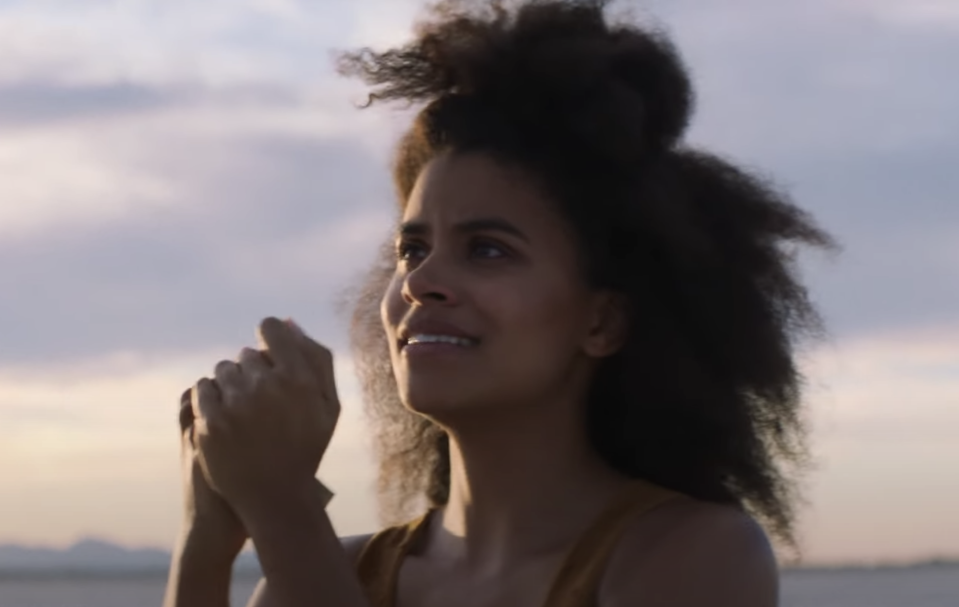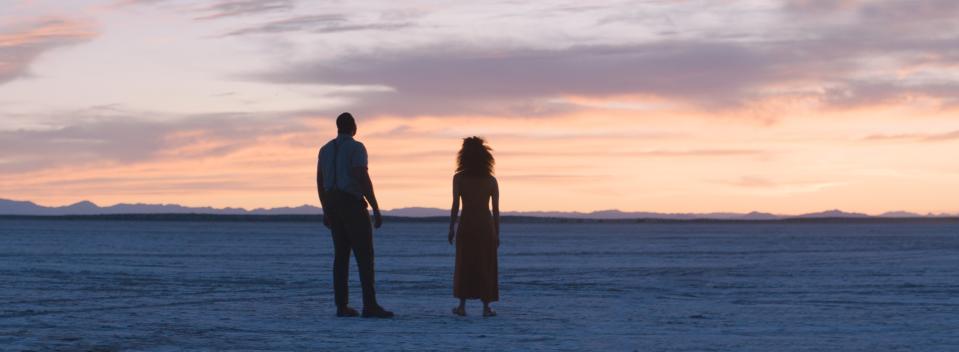How the Pandemic and Black Lives Matter Led the Director of ‘Nine Days’ to Rethink His Own Film

- Oops!Something went wrong.Please try again later.
When Japanese-Brazilian filmmaker Edson Oda arrived at Sundance 2020 with his feature directorial debut “Nine Days,” an immersive film concerning isolation and mortality, he didn’t know how closely our reality would soon match his fable.
A few weeks following the festival, when the world closed down and the terrors of the pandemic took hold, many movies were seen as reflective of pandemic-era anxieties, from “Palm Springs” to “She Dies Tomorrow.” Yet only “Nine Days” spoke to two aspects of the cultural zeitgeist — quarantine and Black Lives Matter — with such striking prescience.
More from IndieWire
From 'Old' to 'The Green Knight,' the Summer's Most Daring Movies Tackle Our Universal Fear of Death
'Nine Days' Trailer: Zazie Beetz Stars in This Existential Fantasy That Dazzled Sundance
The film, which premiered at Sundance in 2020, comes out at a time of tremendous fragility for many Americans. And Oda’s work will provide them with a potent opportunity to process this moment of unprecedented psychological uneasiness.
“It’s been a time for self-discovery for a lot of people,” Oda said in an interview this month. “Everything they went through, in terms of isolation and worries … to process all that new information was a good time to rethink everything by seeing the movie in a different way.”
The seeds of Oda’s film, however, didn’t begin with a virus or protests. For the commercial and music video director, the suicide of his uncle at aged 50 inspired him to explore the essence of the man — not why he died, but how he lived.
The fantastical “Nine Days” centers on Will (Winston Duke), an arbiter of souls stationed in a cozy house located in a desolate desert. Looking through his modest circle-rimmed glasses, Will spends his time watching several people on the various screens making up his wall of televisions. Through an exhaustive selection process, he’s picked these people to live. Now he loads VHS tapes of their lives, jotting down their experiences. “I chose VHS because I think it’s something that really connects me to my childhood,” Oda said. “They were the happiest years of my life.”
Will’s favorite of the group is Amanda, a 28-year-old violin prodigy. He’s shocked to witness her sudden death when she drives her car into a wall. Was it suicide? And if so, how did Will miss the signs?
These questions consume him and his assistant Kyo (Benedict Wong) as they interview a bevy of new souls with varying temperaments: the conniving Alexander (Tony Hale), the shy artistic Mike (David Rysdahl), the pliant Maria (Arianna Ortiz), a practical Kane (Bill Skarsgård), and the free-spirited Emma (Zazie Beetz). These spirits have nine days to prove to Will, through daily tasks, their right to live; if not, they risk fading into nothingness.

YouTube/screenshot
The casting of Duke (“Black Panther” and “Us”) to play a character based on a non-Black person, Oda’s uncle, might seem off to some people. Will is a sensitive figure, an often misunderstood man who’s afraid of living. These are traits that seem to subvert Duke’s broad 6’5” build. But Oda and Duke had more in common than expected. “There’s a lot in my life about subverting expectations,” Oda said. “I’m Japanese-Brazilian and every time I say I’m Brazilian, I have to apologize for being Brazilian. [Because] people are not expecting that.”
Oda was drew to casting Duke based on their shared experiences with the way society judges people of color based on appearance, whether by racial makeup or the content of a person’s character. “In talking to Winston, there’s also this kind of a breaking of expectations,” Oda said. “We had a four-hour conversation about life [because] we both have been through experiences related to his character, and my uncle, who this character is based on.”
For a role totemic of unguarded people, the casting of Duke resonated differently for Oda last summer during the Black Lives Matter protests. “When things like [racism] happen in the world it’s easy for you to think this world is doomed,” explains Oda. “I almost felt like Will, in the sense of asking, ‘Is it worth it?’” To the director, Will possesses a comparable perspective: “There’s so much going against you that you need to be strong. Otherwise all of these forces creating this kind of hate towards you, they will survive and you will perish.”
The deaths of George Floyd and Ahmaud Arbery demonstrated how Black men are often criminalized due to their appearance. The presence of the sensitive Will, dressed in a button-up cardigan, slacks and suspenders, played by a Black man of Duke’s stature, subverts the stereotypical image of Black men. Without relying on bodily trauma, the character’s emotional arc further defines the pain felt by Black people in an oppressive world. That symbolism is further solidified by Duke serving as executive producer: “Nine Days” is at once a Black-funded story and a therapeutic lens for Oda.

The film also touts a longing to experience the outside, which Oda himself felt during quarantine. “I remember just going to the beach during quarantine and feeling how there was a different texture to it,” he said. “Just being there, enjoying the moment, it was my most memorable moment at a beach that I can remember.”
When Will chooses to dismiss a soul from the interview process, he grants them one final wish, a memory they’d like to live. The staging of these scenes, sometimes depicting a beach or a simple bike ride, rely on simple effects that Will creates for each soul as though staging a school play. Watching these characters savor their final moments, these quaint everyday happenings, it’s impossible not to relate to their immediate happiness.
With that abstract emotional quality at the top of his mind, Oda said he pushed back on pressure to pitch the movie as a sci-fi project. “It’s more a kind of weird world, like ‘Being John Malkovich,’” he said. It was Benedict Wong, he added, who coined the most accurate description of “Nine Days” yet: “spi-fi,” or a spiritual fiction. All of these characters are broken, flawed individuals, none more so than Will — which makes “Nine Days” into a movie about survival and the healing process that comes out of traumatic experiences.
Wounds are closed in the film’s most memorable scene, wherein Will stands on the vast desert landscape and delivers a vibrant performance of Whitman’s “Songs of Myself” for Emma. It’s an astounding emotional moment from Duke as he lets the bitterness of the character recede, allowing a charm and childlike wonder to take hold. “When I wrote [the film] I had Whitman in mind, because I was really inspired by ‘Dead Poets Society,’” said Oda. “And then I talked to Winston and said, ‘If you have anything you feel more connected to, then go with it, but if not, go with Whitman?’ At some point, we were trying to find something else but it never felt right in the same way that Whitman felt right.”
It’s not a stretch to see the same hurt swimming in John Keating (Robin Williams) also bubbling up in Will. “Nine Days,” like “Dead Poets Society,” is life-affirming despite some of its darker themes. It’s a narrative invested in telling the stories of the marginalized, the suicidal, and emotionally vulnerable — in other words, some of the people most acutely impacted by quarantine and Black Lives Matter.
Many of us have yet to fully contextualize the bizarre rollercoaster of the last year and a half. But “Nine Days” is a balm, a form of cinematic therapy that makes the case for uplift no matter what happens in a strange and unpredictable universe. It’s a timely message that couldn’t be more welcome.
Best of IndieWire
New Movies: Release Calendar for July 30, Plus Where to Watch the Latest Films
Cannes 2021 Deals: The Complete List of Festival Acquisitions
Sign up for Indiewire's Newsletter. For the latest news, follow us on Facebook, Twitter, and Instagram.

